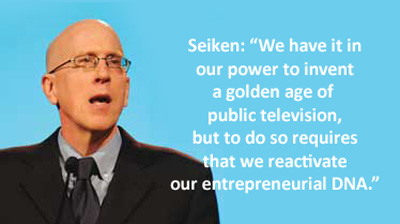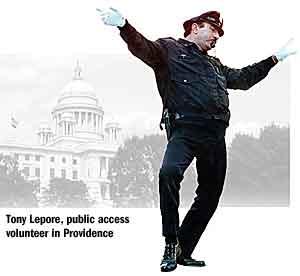Nice Above Fold - Page 510
Needed: courage to shape digital video future
"Today I want to lay out a vision for how we can invent our future, a future where public television is serving millions more people with billions more videos ..."NCME and iMA sponsoring Public Media Innovators audio webinar on Wednesday
Here’s a look at “What ‹audio› means for public radio,” from Matthew Tift of Wisconsin Public Radio. Tift is on the panel for the first-ever Public Media Innovators webinar, at 2 p.m. Eastern Wednesday (May 30) from the National Center for Media Engagement and the Integrated Media Association. Subjects will include PBS’s COVE 2.0, the pros and cons of the PRX HTML5 jplayer for audio, and NPR’s experiment in continuous listening, Infinite Player.NBC, noncom reporting relationships "still in infancy" but producing stories
The collaborations between several NBC owned-and-operated stations and nonprofit news enterprises, part of Comcast’s deal to takeover NBC-Universal (Current, Jan. 17), are generating “important stories they’ve broken together,” reports TVNewsCheck. KNBC Los Angeles and noncom KPPC-FM together revealed that a teacher arrested for sexually abusing students was paid to retire by the local school district. The nonprofit newsroom ProPublica provided data for stories on NBC stations in New York, Dallas, San Francisco, San Diego and Hartford, Conn., on federal stimulus money. And in Philadelphia, WCAU and noncom WHYY regularly share Web content such as political and cultural reporting and weather.
Tiny audience, debt service put Tacoma signal in jeopardy
Public Radio Capital is working to keep an FM station it owns in Tacoma, Wash., on the air after June 30, when Seattle’s KUOW will stop programming it. In six years of operating as an internationally focused alternative to KUOW, KXOT failed to attract enough new listeners to support its operations. PRC is negotiating with National Cooperative Bank, which backed the brokerage’s $5 million purchase of KXOT-FM in 2003. Payments on the loan have stopped while PRC tries to come up with a plan for KXOT. When KUOW began managing the Tacoma station in 2006, its leaders hoped to buy it.Reber leaves NPR; Arganbright, Appleby launch firm; and more...
CIR has hired ex-NPR investigative news head Susanne Reber. As senior coordinating editor for multiplatform projects and investigations for the nonprofit newsroom, Reber will lead national and international investigative and enterprise reporting projects, and guide the center’s team of health and environment reporters. Reber joined NPR in January 2010 to build and lead the network’s first investigative unit as deputy managing editor of investigations. She left NPR this month, according to a May 8 memo by NPR News chief Margaret Low Smith that was published on the Poynter Institute website. Smith put Senior National Editor Steve Drummond in charge of investigations while NPR determines “next steps for the unit’s leadership,” she wrote in the memo.St. Louis Public Radio to acquire Illinois station
The University of Missouri-St. Louis will acquire WQUB-FM in Quincy, Ill., expanding the coverage of its St. Louis Public Radio north along the Mississippi River. UMSL paid $40,000 to buy the station from Quincy University in a deal announced May 18 [2012]. The Quincy signal will rebroadcast St. Louis Public Radio’s lineup of news and talk programming to a potential audience of 120,000 within the 60 dBu contour of the frequency, 90.3 MHz. The sale is expected to be completed within the next three to four months. WQUB will be renamed Quincy Public Radio. St. Louis Public Radio approached the Quincy school after hearing that it was considering getting out of broadcasting to redirect more money into academics, said Tim Eby, g.m.
Alliance with pubTV boosts Rhode Island PEG
Rhode Island is a proven example of what can happen when public TV and public access media collaborate, but their merger is not likely to be widely replicated. However, pubTV and public access executives say their collaboration provides important lessons for the rest of the public media world.Underwriting drop leaves NPR with $2.6M shortfall
Facing an operating deficit of $2.6 million this fiscal year due to a shortfall in corporate sponsorship income, NPR is stepping up efforts to cover the gap with additional gifts, grants and underwriting. These measures are being taken rather than “cutting deep into NPR,” a spokesperson told Current last week, after the Washington Post reported that the network had considered cutting Tell Me More, the daily newsmagazine aimed at people of color. The Post’s report cited anonymous sources describing internal discussions. NPR President Gary Knell later told media outlets that there were no plans to cancel the show. NPR hit a record high in corporate sponsorship income last year but is now struggling, with a variety of factors contributing to the slowdown in sponsorship revenue.WPR site will enable listeners to "see" Bach piece as it is performed
Wisconsin Public Radio has developed a website to accompany its upcoming broadcast of the “Open Goldberg Variations,” which is the “first fan-funded, open source, and completely free recording” of Bach’s “Goldberg Variations,” according to the Boing Boing website. WPR’s site will display the score, enabling listeners to “see” the music as it plays from 12:30 to 2 p.m. Central June 24, “a first-ever event, proving bleeding edge technologies,” said Robert Douglass, who launched the Kickstarter project behind the production. Partnering with WPR is MuseScore, a free music composition and notation software.GMs take up PBS plan to expand web video output
Three dozen general managers have coalesced around a proposal by PBS Interactive chief Jason Seiken to jump-start low-cost local video production at public TV stations. Seiken laid out his plan for reinventing public TV’s new media strategies during the PBS Annual Meeting in Denver.Family of WRVO's Chris Ulanowski publicly discusses his suicide
The family of Chris Ulanowski, the longtime news director of WRVO-FM in Oswego, N.Y., is speaking out about his suicide in a story in the Post-Standard at the one-year anniversary of his death. “Most people didn’t know that the confident professional they heard on the air struggled with a severe mental illness called borderline personality disorder,” the newspaper noted, “which causes unstable moods, behaviors and personal relationships. One in 10 people who have it commit suicide — more than 50 times the rate in the general population — and more than half attempt suicide at least once.”Output: Prop 8 goes down in starry radio docudrama, online cultural essays graduate to videos at KCET.org, and more
On Sunday, June 10, L.A. Theatre Works debuts a radio docudrama about the federal court case that overturned the referendum that banned same-sex marriage in California. Director Rob Reiner assembled an all-star cast to perform 8, which was written by Oscar-winning screenwriter Dustin Lance Black. Brad Pitt plays Chief Judge Vaughn Walker of the U.S. District Court for Northern California; Martin Sheen and George Clooney portray the lawyers who joined forces to argue for gay rights — Ted Olson and David Boies, respectively. Olson and Boies had been combatants in arguing Bush v. Gore before the U.S. Supreme Court, so their alliance in the Perry case added a twist to the case and the dramatization.Sale approval delay by FCC hinders fundraising efforts at KUSF-FM
The FCC has yet to approve the sale of University of San Francisco’s KUSF-FM, which was announced 16 months ago, reports the Bay Citizen. “It’s extremely unusual,” said Michael Couzens, an Oakland, Calif., communications attorney and former FCC staffer. “The mentality of the staff is shaped by the fact that commercial entities lose their financing if they dink and dunk around for months and years.” And because the deal isn’t finalized, federal rules prohibit KDFC from airing pledge drives, “a huge loss as it attempts to remake itself as a nonprofit,” Bay Citizen notes. “The KUSF delay has definitely impacted us, and we hope the FCC will come to a decision soon,” said Brenda Barnes, president of classical music giant KUSC.Ford backs for-profit newsroom
A recent Ford Foundation grant to the Los Angeles Times highlights the heightened competition pubcasters face for philanthropic dollars in a fast-changing media world. The $1.04 million two-year grant to the newspaper, a subsidiary of the Tribune Company media conglomerate, marks the first time Ford has directly supported a major for-profit daily. The money will be used to hire staff members to cover new and expanded beats, including immigration and California’s prison system. The decision to pay for additional reporters, Ford spokesman Alfred Ironside explains in an email, resulted from the grantmaker’s exploration of “new models for sustaining quality, independent journalism that reaches more people at a time when newsrooms are under stress.”Design adapts new KPCC website to multiple mobile devices
KPCC.org, the website for the Pasadena, Calif., pubradio station, has relaunched with a responsive web design that automatically adapts to viewing on smartphones, tablets and desktops — an especially useful feature for the 17 percent of its audience that accesses the content on mobile devices. The site also features a new section specifically for video reports, a daily rotation of featured comments, and redesigned navigation and audio player. “Content silos are one of the toughest problems many news organizations face,” wrote Sean Dillingham, the station’s senior user experience designer, in a post announcing the redesign. “KPCC was/is no different: we produce radio stories, blog posts, program segments, events, videos, and more.
Featured Jobs






